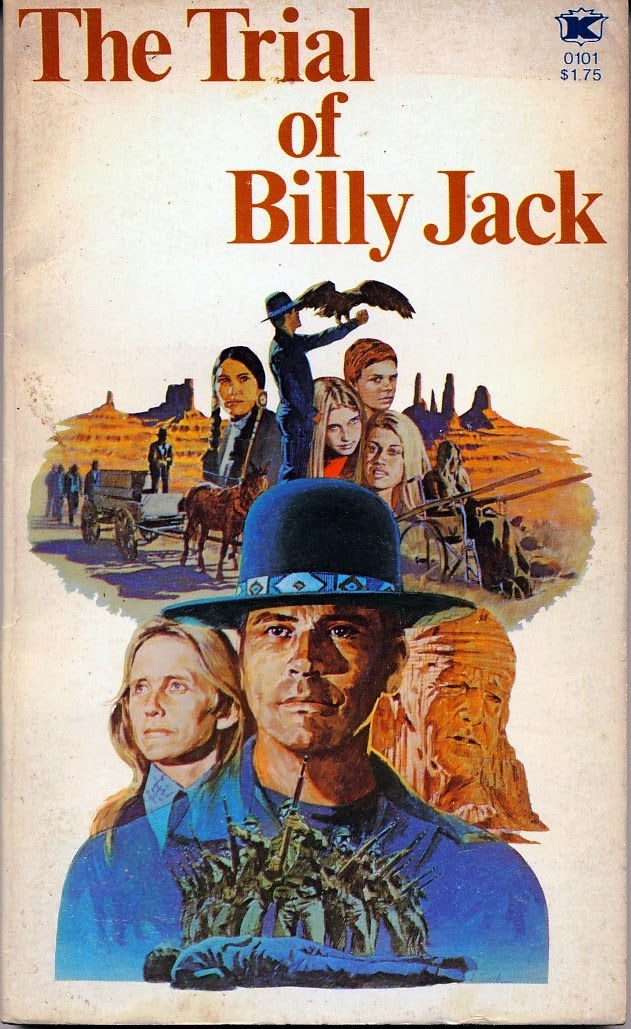Billy Jack on Trial!
- Kelly M. Hudson

- Nov 5, 2020
- 3 min read
In this one, Billy Jack (Tom Laughlin) is on trial for his life from the events of the last film. He gets sentenced to five years for manslaughter and serves his term quietly in jail. Meanwhile, Jean (Delores Taylor) has gotten the school to grow and expand in ways she never thought possible. The kids start a newspaper and then a TV station to report on the hard news, to expose local and national corruption, and to generally be a nuisance to the rich Posner family that runs everything in the area. Soon they piss off the wrong people and the kids start getting physically harassed, again. Meanwhile, Billy is going on several spirit journeys to find an inner peace and to learn what to do about the current situation that is coming to a boil. He ends up beating the crap out of bunch of thugs, getting condemned for not following what his vision told him to do, and then the powder keg blows as he and other students get gunned down by establishment cops. Can the school survive? What about Billy Jack and Jean?
So this one is a big, fat, sprawling mess. But it’s a loveable mess. There’s a lot going on here and even in its nearly three hour running time, it doesn’t feel like everything gets covered or resolved. A lot of the extraneous story stuff from the previous film carries over here, needless exposition and details that really clog things up and bog it down even more here. There’s wild fantasies going on: these kids start a TV station and produce such hard-hitting exposes that they’re targeted for terrorism and death, one of the kids creates a machine that can instantly detect bugging devices, and also creates a machine that can tell when a person on television is lying, etc. While all this is fanciful and fun, it really just serves to cloud the overall story. And as with the last film, the argument between violent and non-violent revolution is again muddied, but here to an even greater extent. Billy is confronted with mystical mumbo-jumbo like “what you hate in your enemy is really what you hate in yourself” and told to be non-violent and get past hurting others, and yet we’re supposed to accept that he or others are required to stand aside as kids get brutalized by thugs and cops? Of course Billy ignores this spiritual advice and breaks out his ass-kicking feet more than a couple of times. The tension between these philosophies is built to explosive levels in this third film in the series, and I commend them on addressing this thorny issue and in ultimately having no real resolution to the conflicting realities. Both sides have salient arguments. Overall, the movie is bloated and not as finely-tuned as the previous entries, and that both works in its favor and to its detriment. I’m not sure what I would cut out as it all flows pretty smoothly and other than the extraneous bits mentioned earlier, it’s all pretty appropriate. What's most compelling and shocking about this film is that it feels so relevant to today, with how it addresses political corruption and police violence towards protesters. Sadly, not much has changed in all the years since this was made. I think of this one as an imperfect, shambling mess, that’s so damned loveable you forgive any sins it commits and just get into the vibe and enjoy it anyway. Plus, the two ass-whopping scenes are delicious.
When you get to this film, you definitely need to see the previous movie to understand what’s going on. Best get yourself a warm blanket, a big bowl of popcorn and snuggle in for a long, long ride. The journey is more than worth it, but you will at times find yourself checking your watch out of incredulity. Also, one question: I remember seeing a cut of this film where they sing “Give Peace a Chance” by John Lennon for like fifteen minutes at the end. It wasn’t on this version. Was this cut out or was I just hallucinating before? There’s an end card saying “Give Peace a Chance,” but that’s it.
★★★☆






Comments